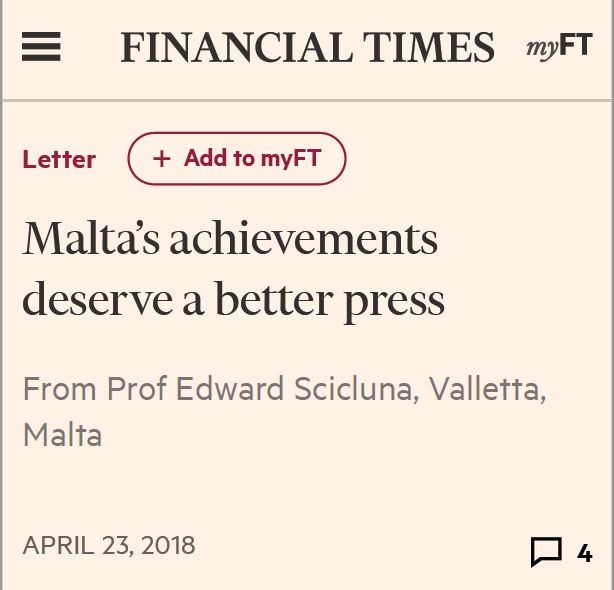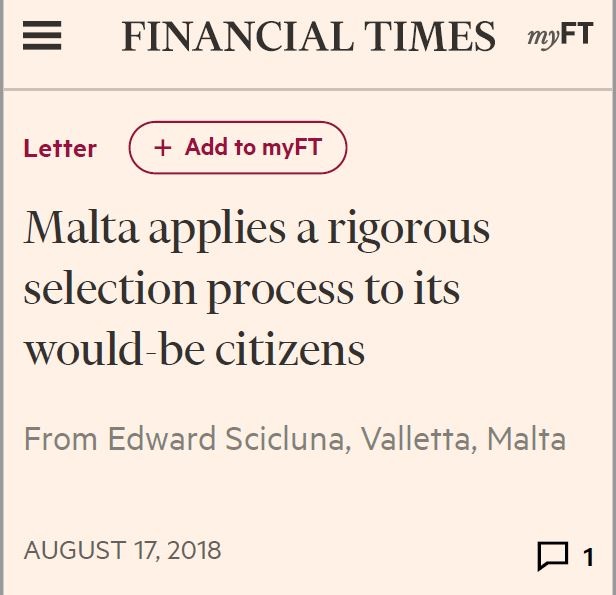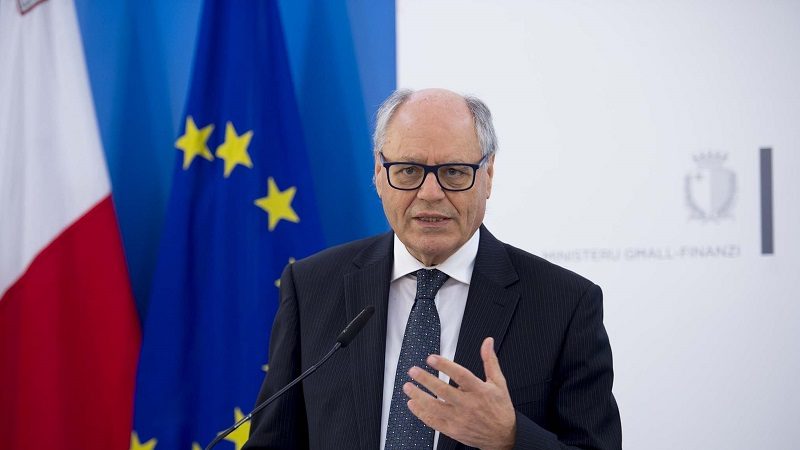Finance Minister Edward Scicluna is under fire for his ineffectiveness in fighting systemic crime and corruption in Malta’s financial sector. The Shift News dissects two letters Scicluna wrote to The Financial Times, showing his use of deflection, lies, and spin to defend his record of failure.
Edward Scicluna is setting the record for Malta’s worst performing Finance Minister. He has:
- Presided over the Financial Intelligence Analysis Unit’s breach of European Union Law – a first for Malta, and the second investigation of its kind from the European Banking Authority (EBA);
- Presided over the set up of a private bank – Pilatus Bank, whose owner – Ali Sadr Hasheminejad – is now charged in the US with breaching sanctions, money laundering and founding a bank on criminal proceeds and with criminal intent.
- Faced repeated calls for his resignation in Malta and international criticism for his ineffectiveness in dealing with systemic crime and corruption in Malta’s financial sector.
When first confronted with the news about Pilatus’ seizure by the financial services regulator, following intense pressure from US authorities, his now infamous reply was “U ejja come on, you’re going to ask me these questions in the morning?”
Scicluna found the time to write two letters to The Financial Times in response to the world-leading business daily’s coverage of crime and corruption in Malta’s financial sector. He was criticised in an editorial in The Malta Business Weekly last week to which the Minister replied that he did so to defend Malta’s reputation… but just how far did he need to bend the facts to do so?
Letter 1: 23 April, 2018:

“While we welcome the attention, and your recognition of Valletta’s highly successful role as the 2018 European Capital of Culture, I do not feel you have depicted our financial services industry either accurately or fairly.”
From Scicluna’s opening paragraph. The article to which he’s responding here makes no mention of the fraught, disorganised, and discredited V18. The FT covered V18 in a paid advertorial, a favourite PR device of the government’s, on 23 February and then in a highly critical piece, ‘Rivalry and corruption animate Malta’s cultural capital’, on 11 April.
Other FT pieces, including a ‘Big Read’, were factual reports on Pilatus Bank, the FIAU’s breach of Union Law, and Daphne Caruana Galizia’s assassination.
“…strong regulatory and governance framework, clear and transparent legislation and rule of law, a low cost-environment and, crucially, access to the single market thanks to our proud membership of the EU.”
Description of Malta’s advantages by Scicluna, whose Party and Leader in particular campaigned vociferously against Malta’s EU membership and before realising they can sell access to it. According to the World Bank’s Governance Indicators, Malta’s rule of law, control of corruption, government effectiveness, and regulatory quality have all deteriorated sharply since 2013, when the Labour Party was elected. Malta’s rule of law deterioration was the fastest in the EU since 2013.
Malta’s ‘rogue elements’, as Scicluna calls them, aren’t just protected from prosecution but are institutionalised.
“There are lawbreakers and fraudster everywhere, and it would be wrong to single out any one jurisdiction. The issue is how one deals with them.”
It’s only that 1) there’s an unusually high concentration of “lawbreakers and fraudsters” in Malta, and 2) Malta’s “rogue elements”, as Scicluna later calls them, aren’t just protected from prosecution but are institutionalised. That, in fact, is “how one deals with them” in Malta – a carte blanche from the State. The EBA’s investigation of the FIAU was only the second time that the EBA investigated anti-money laundering failures in a national authority. Pilatus Bank’s owner was arrested and charged in the US.
“The Maltese have already charged three people in connection with [Daphne Caruana Galizia’s] murder and their investigation is continuing. Justice will prevail.”
Of all Scicluna’s comments, this is the most deceitful. Scicluna’s Party and government have turned their violent dehumanisation campaign against Caruana Galizia into one against those campaigning for justice. The government has refused calls for a public inquiry into Caruana Galizia’s assassination from her family and various NGOs, publishing instead a letter that mocked the name of Caruana Galizia’s website and implied that her family were being economical with the truth.
The government also lost – and is now appealing – a constitutional case to have deputy police commissioner Silvio Valletta, married to a government minister and previously on the FIAU’s board, pulled off the murder investigation. He had also been the subject of Caruana Galizia’s reporting.
“In the case of Pilatus Bank, our authorities have seized control of that institution. We are co-operating with international crime agencies and regulators to uncover any potential wrongdoing and take effective action.”
Scicluna’s career to date is marked by inaction in the face of crime and corruption throughout the sector for which he has ministerial responsibility. Pilatus Bank’s assets were seized following unprecedented pressure from the FBI, the US Department of Justice, the European Commission, and opposition politicians in Malta. Caruana Galizia first revealed criminal operations within Pilatus Bank in April 2017. The FIAU first uncovered criminal activity at Pilatus Bank in March 2016. The MFSA inspected Pilatus Bank in the first quarter of 2015.
Letter 2: August 17, 2018:

“…as is well known, Malta is one of the many EU member states offering a “citizenship by investment” programme, in order to attract investment and talent to support and diversify its small open economy.”
Here Scicluna is using the government’s deliberate conflation of various citizenship by investment schemes. While some EU states have residency by investment programmes, where people are granted temporary residency permits based on large investments, the only ones to offer citizenship – a passport – are Austria (for exceptional cases and a price tag of €10 million), Cyprus (for €2 million), a country plagued by corruption and financial crime, and Malta (for €650,000), which faces the same corruption and financial crime issues as Cyprus. Hungary ran a residency programme from 2013, but suspended it in 2017.
Malta’s criteria for citizenship are the lowest of all programmes. A study by Transparency International found that these schemes foment cross-border corruption.
“Overseen by an independent body, our programme does not discriminate on the basis of nationality. Instead, it enforces a rigorous application process for all candidates and boasts a high rejection rate. It is also a transparent process publishing the names of all successful applicants and has done so right since the programme began in 2014, and not just recently as your story incorrectly suggests.”
Identity Malta is the government agency that oversees Malta’s cash for passports scheme. It is – as defined in law – not independent from government. Its chief purpose is assisting the government minister responsible for citizenship, who is empowered to hire and fire the agency’s board members and CEO. The agency is currently chaired by Labour Party activist Ian Castaldi Paris.
Neither is the application process rigorous: three Russian billionaires who bough passports in 2016 — Arkady Volozh, Boris Mints, and Alexander Nesis – are on the White House’s ‘Kremlin List’, which identifies businessmen who are close to Putin.
Neither is it a “transparent” process: the government fought off pressure to publish names of passport buyers both domestically and from the European Commission. It finally caved, publishing in 2017 the first names of those who bought passports in 2016. The published list included those who married Maltese, had a Maltese parent, or were born abroad of Maltese descent, effectively making it impossible to identify who had bought a passport.
“Since our programme was introduced in 2014 it was, and still is, the only programme to be evaluated and approved by the European Commission. We therefore more than welcome the announcement that the European Commission will soon publish a report on so-called “citizenships for sale” in its drive against money laundering.”
What Scicluna is twisting here is the strong negative reaction from Europe after Caruana Galizia broke the Labour Party’s previously secret cash for passports scheme in 2013. The European Commission then said in November 2013 that it has no power to stop Malta, or any other Member State, from selling EU citizenship, triggering a debate on whether EU States should be able to sell passports. MEPs, in January 2014, then voted: 560 against the sale of passports; 22 for sale of passports; with 44 abstentions.
The overwhelming majority of MEPs voting to stop passport sales forced the European Commission into intervening. Then EC Justice Commissioner Viviane Reding suggested legal intervention on the grounds that passport sales violated a treaty on “sincere co-operation” with fellow EU countries, telling the parliament, “Do we like the idea of selling the rights provided by the EU treaties? Certainly not. Citizenship must not be up for sale”.
Later that month, the Maltese government sought to diffuse the debate by raising the price tag of a Maltese passport and instituting a weak residency requirement. The current Justice Commissioner Vera Jurova remains deeply concerned about Malta’s passport scheme, telling The FT that schemes such as Malta’s will come under tougher scrutiny from Brussels as part of a wider drive against money laundering and corruption.
“Your correspondent also links our citizenship programme to “high-profile money-laundering scandals involving banks”, which I find puzzling.”
Here Scicluna uses the government’s PR strategy of using the magisterial inquiry into Caruana Galizia’s reporting on Egrant Inc, only part of which has been published, to obscure the multitude of scandals surrounding the government’s cash for passports scheme and other high profile money laundering scandals, including:
1) an FIAU report on kickbacks on passport sales shared between the Prime Minister’s consultant Brian Tonna and his chief of staff Keith Schembri through Pilatus Bank,
2) an FIAU report on kickbacks shared between disgraced former managing director of Allied Newspapers Adrian Hillman and Keith Schembri,
3) an FIAU report on systemic anti-money laundering failures at Pilatus Bank, and
4) Tourism Minister Konrad Mizzi’s offshore, once secret financial structure that is typical of money laundering set ups.
Egrant Inc is one part – that remains unresolved – of a wide and expanding network of financial crime suffocating Malta. It will take more than some creative writing in letters to The FT to bury that fact.












